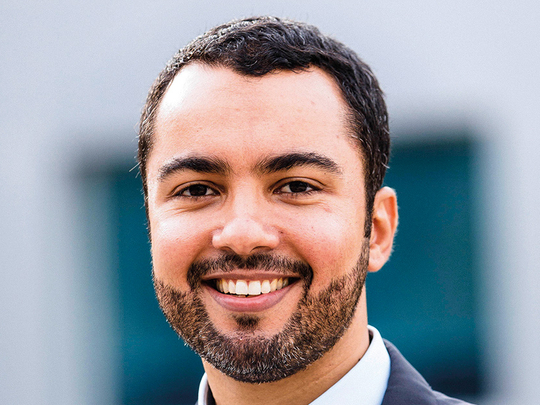
Dubai: Expo 2020 Dubai on Monday announced the first recipients of their Expo Live grants to socially responsible fledgling start-ups.
The 29 winners of the $100,000 (Dh367,000) social entrepreneurship grants have been selected from 575 applications, from 71 countries, in a three-stage selection process.
The winning applications come from 23 different countries, emphasising the global nature of the Expo, said Yousuf Caires, Vice-President of Expo Live. “Expo 2020 is a global event in Dubai. Expo Live mirrors that,” he said. “We need to deliver on that global promise.”
The $100 million Expo Live programme, which will announce new grants twice a year to October 2019, is not simply intended to support promising start-ups, he said, but to support those intended to make a profit while having a positive social impact.
“It’s making money while doing good,” he said. “It’s business with a purpose ... It’s not one or the other — they have to go together.”
Expo Live set out to counter two gaps its research exposed in the start-up accelerator, incubator and funding sector.
Tech business
The first is geographical disparity. “If you are in London, if are in Silicon Valley, there is money for you,” Caires said. “If you are in the tech business there is a lot of money for you. What we found is that when you go to less traditional markets the opportunity for funding isn’t always there, especially if you are in an area that banks find too risky.”
The second gap is in the level of funding. The scheme sets its grants at $100,000 to position them between the small-scale funding options of tiny, fresh operations, and between the kind of projects looking at attracting high-level venture capital or angel investors. The grants are designed for companies that have set up, and produced prototypes, but need help to scale up to full production.
As an added incentive, each grant winner will be invited to attend expo as a global innovator, with the support, resources, training and exposure to help them turn their presence into an advantage. “They’re going to get into those meetings, they’re going to get their one-minute pitches to the VCs [venture capitalists], to some of the funders from our region,” Caires said. “They’ll have a chance to talk to some of the big shots who are coming to Expo.
“We call it ‘partnership ready’. Our role is not just to fund them. We can fund them, but we can say, ‘Hey, if these guys develop, they need to prep up for that connecting minds moment.’
“These guys represent Expo 2020. They represent who we are.”
Overly risky
Caires said he did not expect all of the funded start-ups to succeed. “If we’re too conservative, we’re not catching the good stuff. If we’re overly risky, we might be throwing some money away — money that we don’t necessarily have to waste.
“We know it’s a pipeline game, a portfolio game, and what we hope is that if we do our job right I think we’re going to get there, having a good nose for what these social entrepreneurs are and the kind of value [in what] they’re doing and the kind of progress they can make, and having a hope that a chunk of them will … surpass Expo as an entity, and we will forever be a part of their legacy.”
Factbox: Case studies
Gulf News asked Yousuf Caires to pick three of the first-tranche winners as examples of the kind of firms and ideas Expo Live was looking for.
Smart Labour (Dubai)
Smart Labour has developed a free app to help incoming labourers adapt to life in Dubai, including basic translation software and guides to life in Dubai, including suggestions of what to do in their free time, in their own language. Its founder was a labourer. “We felt that this was not just a good problem to solve, because it’s very relevant to our region, but we just liked the idea that this guy came up and said, ‘You know, I’m from this. I’m the best suited to solve this.’ Smart Labour is one that bounced me off my chair when we heard him pitching.”
Ignitia AB (Sweden)
Ignitia has developed a subscription-based app to forecast rain to a degree twice as accurately as other weather services in order to help farmers grow crops more reliably. Using satellites, the app can predict with high precision not only when rain will fall, but where, especially in the tropics — it specifies rain in Jumeirah, for example, rather than Dubai. “Instead of making a chunk of money by selling it off, they want to use the technology to help smallhold farmers in Kenya and in West Africa, to get better data on when it’s going to rain. If you can imagine the value to a farmer who gets a text message saying, ‘There’s an 80 per cent chance of rain tomorrow …’ He can work the land. What we liked about they is that there is significant technological innovation there, but also the choice. They’re using it to help those who actually do suffer with the inconsistency of forecasts.”
Wave (Nigeria)
West Africa Vocational Education aims to match young people without formal qualifications to find formal jobs matching their skills, helping curb youth unemployment. “They find a guy, he can sell. He doesn’t have the CV, he doesn’t have the qualification, but he’s got the competency. They’re pushing this mini-revolution between what recruitment companies do, what companies expect, and pushing for competency-based employment. They’ve been quite successful in taking people from the non-formal sector into the formal sector and helping companies also get a better deal on their recruitment. It’s a contextual solution to a global problem.”


